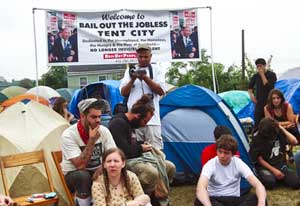PITTSBURGH
Tent City dwellers inspire activists
By
Brenda Sandburg
Published Oct 10, 2009 7:27 AM
People from across the country set up a Tent City in Pittsburgh dedicated to
the millions who are unemployed and homeless. The gathering took place from
Sept. 20 to 25 during the week of the G-20 summit when banking and finance
officials from 19 countries and the European Union met to discuss how to
protect their profits.
Organized by the Bail Out the People Movement and the Rev. Thomas E. Smith of
Baptist Monumental Church, the Tent City encampment was located next to the
church. It grew to more than 100 people by the end of the week.
Many of those who came had lost their homes and jobs and refused to be silent
or invisible any longer. They drew strength from each other and shared ways to
push the struggle for jobs and housing forward.
“Here everyone is coming together while at home everyone is
separate,” said Debbie Kendall of St. Petersburg, Fla. She and her
spouse, Jessie Kendall, have been living on the sidewalks of St. Petersburg for
the past two months.
Jessie, who has worked as a weld fabricator, bricklayer and construction
worker, said it has been hard to get work since Sept. 11, 2001. The couple has
gotten small jobs that do not provide enough income to live on. For a while
they sold newspapers, making 50 cents per paper.
The Kendalls came to Pittsburgh with two ministerial groups that are part of
the Poor People’s Economic Human Rights Campaign. Harry Hoffman, who was
also part of the group, was laid off in August and lost his residence the same
week. He said they were representing the entire homeless population of St.
Petersburg of about 6,000.
Several people came from Picture the Homeless, a group in New York City founded
and led by the homeless that is fighting for justice around housing. Others
traveled long distances to be there. John Parker, an organizer of the Bail Out
the People Movement in Los Angeles, drove across country in a van with several
others and Jutta Sundermann, a member of the international group Attac, came
all the way from Germany.
Ricardo and Mary Adams came from Rochester, N.Y., with their two daughters,
three-year-old Sarah and one-year-old Maya, who added a special spirit to the
encampment. The couple met volunteering with a group that drove a bus around
the city providing housing for people who were denied space in homeless
shelters. The bus had heaters and cots. The group has disbanded and Mary said
she was inspired by Tent City to restart a similar service.
The couple said this was a great experience. “I was blown away by the
solidarity of The Hill neighborhood,” Ricardo said. Many people donated
water and food and came by to talk and participate in workshops.
The political discussions were unique, as people shared their strategies and
successes in the fight against evictions and foreclosures. At a workshop on
housing Rob Robinson of Picture the Homeless described how his group has
occupied empty buildings in New York to provide homes for people.
“Talking got us nowhere,” he said. “Until you step it up and
get radical, shake the foundation, things don’t change.”
Others have been able to block evictions by rallying the community together.
Rosemary Williams, of the Poor People’s Economic Rights Campaign in
Minneapolis, said she fought eviction from her home for a year. On Sept. 11,
dozens of police blocked the streets and sidewalks around her house. More than
a hundred people came out to support her and the police arrested seven.
Williams, whose family had lived on the same block for 55 years, said she is
not giving up and emphasized how important it is for people to mobilize to
fight back.
Jerry Goldberg, an organizer in Detroit with the Moratorium NOW! Coalition to
Stop Foreclosures, Evictions and Utility Shutoffs, described the battles his
group has waged in the courts and in the streets. One 72-year-old woman who had
been in her home for 42 years had come up with the money Countrywide had
demanded but they wouldn’t take it and she was about to be evicted. But
after people protested at Bank of America—which owns
Countrywide—the mortgage lender backed down.
The Detroit group has also pushed for legislation to impose a moratorium on
foreclosures. A bill has been introduced in the state Senate that calls for a
two-year moratorium. Goldberg said that in the 1930s, 25 states enacted
five-year moratoriums on foreclosures. Detroit is one of the hardest hit
cities, with an unemployment rate of 28.9 percent. In the last year one million
industrial jobs have been lost and tens of thousands of homes have been placed
in foreclosure.
Participants in the Tent City encampment were strengthened hearing of these
battles and of the resolve of so many to continue fighting and bringing more
people into the struggle.
“The Jobs March and Tent City was a tremendous achievement,” said
Dave Welsh, a delegate to the San Francisco Labor Coun-cil who came with his
spouse, filmmaker Loni Ding. “During this incredible week, union folks
like me were able to exchange ideas and experiences with people who are
homeless or unemployed and busy organizing their communities to
fight.”
Welsh noted that in the 1930s there was a mass movement across the U.S. for
jobs and to get people back into their homes, and that all the mass pressure
resulted in New Deal programs that created a lot of real jobs. The Tent
City’s global week in solidarity with the unemployed “raised my
hopes we can really rebuild this movement just like they did in the
1930s,” he said.
Articles copyright 1995-2012 Workers World.
Verbatim copying and distribution of this entire article is permitted in any medium without royalty provided this notice is preserved.
Workers World, 55 W. 17 St., NY, NY 10011
Email:
[email protected]
Subscribe
[email protected]
Support independent news
DONATE


